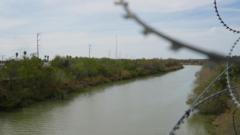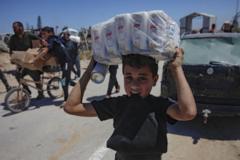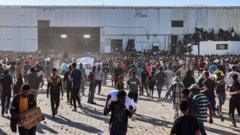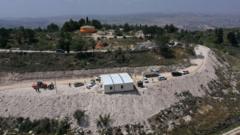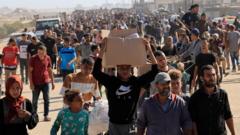The recent fatal shooting of a Palestinian American teenager by Israeli forces is raising urgent questions regarding the use of force and accountability in the region, particularly as violence surges in the West Bank.
Israeli Forces Under Fire After Fatal Shooting of 14-Year-Old American

Israeli Forces Under Fire After Fatal Shooting of 14-Year-Old American
The death of Amer Rabee, a Palestinian American, has ignited outrage over military conduct and oversight in the West Bank.
The clothes were scattered across a hillside rich with olive and almond trees above a busy highway in the Israeli-occupied West Bank. Among the wildflowers, remnants of a life interrupted—a torn black T-shirt, some black Converse socks, and a pair of white Nike sneakers—telling the story of a 14-year-old boy who would never return home.
On April 6, in Turmus Aya, a village predominantly inhabited by residents with U.S. citizenship, Israeli soldiers fatally shot Amer Rabee, a Palestinian American born in New Jersey. The military later delivered Amer's lifeless body, riddled with bullet wounds, to his family wrapped in a blue body bag.
The Israeli military claimed that Amer, along with two friends, had been throwing rocks at passing vehicles and deemed them a threat to civilians, labeling Amer and his friends as "terrorists." However, Amer's family, along with a surviving friend, firmly dispute this narrative, stating they were simply out picking almonds. Eyewitness accounts share that Amer sustained multiple gunshot wounds to his upper body, as evident in photographs provided by family members to The New York Times.
This incident has amplified existing allegations of excessive force by the Israeli military and calls for accountability in a context of increased aggression against Palestinians. Such dynamics find their roots in a period marked by a rise in violent confrontations in the West Bank, where military operations have intensified against perceived militancy, exacerbating tensions further compounded by recent acts of violence against Palestinians by extremist settlers.
On April 6, in Turmus Aya, a village predominantly inhabited by residents with U.S. citizenship, Israeli soldiers fatally shot Amer Rabee, a Palestinian American born in New Jersey. The military later delivered Amer's lifeless body, riddled with bullet wounds, to his family wrapped in a blue body bag.
The Israeli military claimed that Amer, along with two friends, had been throwing rocks at passing vehicles and deemed them a threat to civilians, labeling Amer and his friends as "terrorists." However, Amer's family, along with a surviving friend, firmly dispute this narrative, stating they were simply out picking almonds. Eyewitness accounts share that Amer sustained multiple gunshot wounds to his upper body, as evident in photographs provided by family members to The New York Times.
This incident has amplified existing allegations of excessive force by the Israeli military and calls for accountability in a context of increased aggression against Palestinians. Such dynamics find their roots in a period marked by a rise in violent confrontations in the West Bank, where military operations have intensified against perceived militancy, exacerbating tensions further compounded by recent acts of violence against Palestinians by extremist settlers.

